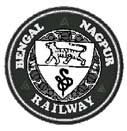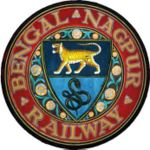Bengal-Nagpur Railway: Difference between revisions
HughWilding (talk | contribs) External link added |
HughWilding (talk | contribs) Infoboxes & content added |
||
| Line 1: | Line 1: | ||
{{Line Railways Infobox | |||
|image= Bnr.jpg | |||
|caption= ''Bengal-Nagpur Railway device'' | |||
|route= [[Nagpur]] to [[Asansol]] | |||
|gauge1= Broad gauge | |||
|gauge1details= 1696 miles (1905) | |||
|gauge2= | |||
|gauge2details= | |||
|gauge3= | |||
|gauge3details= | |||
|gauge4= | |||
|gauge4details= | |||
|timeline1date= 1887 | |||
|timeline1details= Company formed | |||
|timeline2date= 1888 | |||
|timeline2details= Existing metre gauge converted to broad | |||
|timeline3date= | |||
|timeline3details= | |||
|timeline4date= | |||
|timeline4details= | |||
|timeline5date= | |||
|timeline5details= | |||
|presidency= [[Bengal]] | |||
|stations= | |||
|system1date= | |||
|system1details= Worked by Bengal-Nagpur Railway | |||
|system2date= | |||
|system2details= | |||
|system3date= | |||
|system3details= | |||
}} | |||
{{System_Railways_Infobox | |||
|image= Bengal_Nagpur_Railway_logo.jpg | |||
|caption= ''Bengal-Nagpur Railway device'' | |||
|timeline1date= | |||
|timeline1details= | |||
|timeline2date= | |||
|timeline2details= | |||
|timeline3date= | |||
|timeline3details= | |||
|timeline4date= | |||
|timeline4details= | |||
|timeline5date= | |||
|timeline5details= | |||
|company1= | |||
|company1details= [[Bengal-Nagpur Railway]] | |||
|company2= | |||
|company2details= [[Jubbulpore-Gondia Railway]] | |||
|company3= | |||
|company3details= [[Mohurbhanj Railway]] | |||
|company4= | |||
|company4details= [[Parlakimedi Light Railway]] | |||
|company5= | |||
|company5details= [[Raipur-Dhamtari Railway]] | |||
|company6= | |||
|company6details= | |||
|company7= | |||
|company7details= | |||
|company8= | |||
|company8details= | |||
|company9= | |||
|company9details= | |||
|company10= | |||
|company10details= | |||
|company11= | |||
|company11details= | |||
|company12= | |||
|company12details= | |||
|headquarters= [[Calcutta]] | |||
|workshop= | |||
|stations= | |||
|system1date= | |||
|system1details= | |||
|system2date= | |||
|system2details= | |||
|system3date= | |||
|system3details= | |||
|gauge1= | |||
|gauge1details= | |||
|gauge2= | |||
|gauge2details= | |||
|gauge3= | |||
|gauge3details= | |||
|gauge4= | |||
|gauge4details= | |||
|auxillary forces= | |||
}} | |||
The '''Bengal-Nagpur Railway''' (BNR) was formed in 1887 to take over the metre gauge [[Nagpur-Chhattisgarh Railway]], to convert the existing metre gauge track to broad gauge and to extend the system eastwards to join the East Indian Railway at Asansol, 132 miles from Calcutta. | |||
The BNR was the last major | == History == | ||
The BNR was the last major railway formed to benefit from a Government guarantee, with the system from the outset owned by the GoI who contracted the BNR company to manage matters, initially for 25 years and therafter determinable every 10 years. The BNR was the last company to be nationalised, on 1 October 1944. In 1952, the BNR was merged with the [[East Indian Railway]] to form Indian Railways' '''Eastern Railway''' but in 1955, BNR re-emerged to form '''South Eastern Railway'''. | |||
== Records == | == Records == | ||
[[Image:Bnrkhargur.jpg|thumb|BNR Loco Running Staff 1910]] | [[Image:Bnrkhargur.jpg|thumb|left|BNR Loco Running Staff 1910]] | ||
There are no Staff agreements held at the [[British Library]] in the [[India Office Records]]. | There are no Staff agreements held at the [[British Library]] in the [[India Office Records]]. | ||
A series of articles on the BNR, then celebrating its (highly significant) 25th year, was published during 1911 in ''The Indian Railway Gazette''. The December 1911 issue carried biographical entries on the top 12 staff complete with | A series of articles on the BNR, then celebrating its (highly significant) 25th year, was published during 1911 in ''The Indian Railway Gazette''. The December 1911 issue carried biographical entries on the top 12 staff complete with individual photographic portraits. Microfilm of the Gazette can be consulted at the '''British Library's Newspaper Reading Room''' at Colindale (see below for link). | ||
There are some reports, letters and notes on the railway's history covering 1890-1930 held at '''Hertfordshire Archives and Local Studies''', including copies of the ''Bengal-Nagpur Railway Magazine'' for July 1929, August 1929, November 1930 and December 1930. | There are some reports, letters and notes on the railway's history covering 1890-1930 held at '''Hertfordshire Archives and Local Studies''', including copies of the ''Bengal-Nagpur Railway Magazine'' for July 1929, August 1929, November 1930 and December 1930. | ||
The '''South Eastern Railway''', a zone of Indian Railways, carries much historical material on its website (see below for link). | |||
<br> | |||
<br> | |||
== External Links == | == External Links == | ||
Revision as of 20:45, 31 December 2008
| Bengal-Nagpur Railway | ||
|---|---|---|
 Bengal-Nagpur Railway device | ||
| Line of route | ||
| Nagpur to Asansol | ||
| Gauge / mileage | ||
| Broad gauge | 1696 miles (1905) | |
| Timeline | ||
| 1887 | Company formed | |
| 1888 | Existing metre gauge converted to broad | |
| Key locations | ||
| Presidency | Bengal | |
| Stations | ||
| System agency | ||
| Worked by Bengal-Nagpur Railway | ||
| How to interpret this infobox | ||
| Bengal-Nagpur Railway | ||
|---|---|---|
 Bengal-Nagpur Railway device | ||
| System timeline | ||
| Constituent companies / lines | ||
| Bengal-Nagpur Railway | ||
| Jubbulpore-Gondia Railway | ||
| Mohurbhanj Railway | ||
| Parlakimedi Light Railway | ||
| Raipur-Dhamtari Railway | ||
| Key locations | ||
| Headquarters | Calcutta | |
| Workshops | ||
| Major Stations | ||
| Successor system / organisation | ||
| System mileage | ||
| Associated auxiliary force | ||
| How to interpret this infobox | ||
The Bengal-Nagpur Railway (BNR) was formed in 1887 to take over the metre gauge Nagpur-Chhattisgarh Railway, to convert the existing metre gauge track to broad gauge and to extend the system eastwards to join the East Indian Railway at Asansol, 132 miles from Calcutta.
History
The BNR was the last major railway formed to benefit from a Government guarantee, with the system from the outset owned by the GoI who contracted the BNR company to manage matters, initially for 25 years and therafter determinable every 10 years. The BNR was the last company to be nationalised, on 1 October 1944. In 1952, the BNR was merged with the East Indian Railway to form Indian Railways' Eastern Railway but in 1955, BNR re-emerged to form South Eastern Railway.
Records

There are no Staff agreements held at the British Library in the India Office Records.
A series of articles on the BNR, then celebrating its (highly significant) 25th year, was published during 1911 in The Indian Railway Gazette. The December 1911 issue carried biographical entries on the top 12 staff complete with individual photographic portraits. Microfilm of the Gazette can be consulted at the British Library's Newspaper Reading Room at Colindale (see below for link).
There are some reports, letters and notes on the railway's history covering 1890-1930 held at Hertfordshire Archives and Local Studies, including copies of the Bengal-Nagpur Railway Magazine for July 1929, August 1929, November 1930 and December 1930.
The South Eastern Railway, a zone of Indian Railways, carries much historical material on its website (see below for link).
External Links
British Library Newspapers, Colindale
"Major Events in Formation of S.E. Railway" A timeline from 1887 to 2001 of the South Eastern Railway (formerly BNR).
"Evolution of SER over the years" A history of the South Eastern Railway, including the BNR and its constituents.
Hertfordshire Archives and Local Studies
Kharagpur’s Diaspora Reunited Memories and photos of a BNR family, the Cramptons, from the 1930s to 1950s.
Untitled pdf file South Eastern Railway (accessed 04 December 2008).